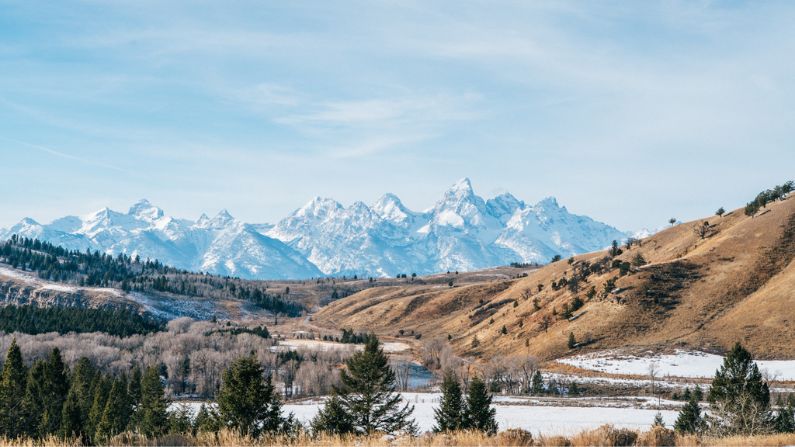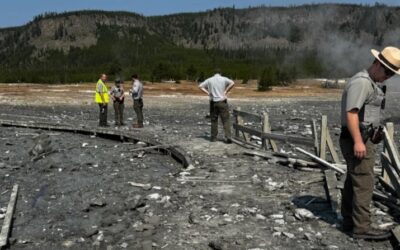Voters decided to largely stick to the status quo in Teton County during this week’s election, with incumbents holding onto their seats and Democrats continuing to dominate the political scene. About 70% of voters also supported continuing to fund the Teton Conservation District through property taxes.
This vote has swung in the conservation district’s favor every four years since 1998, but elections remain a stressful time for district employees, as the fate of the organization hangs in the balance.
Executive Director Carlin Girard sat down with KHOL on Zoom to discuss why the organization continues to rely on this kind of funding.
This conversation has been edited for clarity and brevity.
Hanna Merzbach/KHOL: Teton County has tons of conservation groups. Would you just start by telling me what sets Teton Conservation District apart?
Carlin Girard: Great question. So, Teton Conservation District is local government. We have an elected board. We sit under the Department of Agriculture at the state level. So, I think fundamentally we’re very different from a lot of the conservation organizations in the sense that we’re a governmental structure, but we have a ton of flexibility in the scheme of governments.
The biggest project we just put on the ground was the Mountain Neighbor Handbook. Also, in the last couple of days, we just got the final report for the septic system effluent monitoring project. And we’ve been partnering with the Jackson Hole Wildlife Foundation to create levee ramps for wildlife passage inside of the river corridor. And we’ve been working a lot with local agriculture on conservation practices and property owners on native plantings.
KHOL: To get to the news, in this week’s election, about 70% of Teton County voters supported continuing to fund the Teton Conservation District for the next four years. Most of your funding comes from these property taxes — it’s about 1/100th of what homeowners pay. How did it feel to see this pass once again?
Girard: So, it’s a really big deal to us because the structure we currently have as an organization is really based upon having that mill levy. If we didn’t have it, we’d have to certainly change our granting opportunities, which are very meaningful throughout the community. And we probably would have to also change our staffing structure.
KHOL: And on top of that, I know this year the question about the conservation district tax was left off the ballot. Voters had a separate piece of paper in which they voted for or against it. Did that add to that stress?
Girard: This year was interesting in that way, and luckily we caught it really early, so we didn’t have to do some sort of separate ballot associated with the district tax. I think, in the end, it was just fine. It’s a stressful time for the conservation district and our partners, and so any deviation is a little nerve-racking. But, we were really thankful for the work that the clerk did to get a resolution right away. And in the end, who knows, maybe it benefited us.
KHOL: I know that the tax has passed every four years since 1998, sometimes by a pretty big margin like this year and sometimes by a tighter margin. Do you think this is an effective way to continue to fund the district?
Girard: So, there are different mechanisms to fund the district. We’ve made the choice to use this funding mechanism because it keeps us on our toes. Another way is you can put forward a ballot proposition that just reads differently and says that the voters will approve up to one mill in perpetuity until there’s a referendum vote. So, that would be granting access for the conservation district to collect those funds until another vote occurs that would say we weren’t allowed to collect the funding. We can also be funded through the county commission. And then lastly, we can write grants. The property tax, however, is extremely efficient from the perspective of gaining funds and distributing them on the ground.
KHOL: Why put this on the ballot every four years rather than that second option, where voters fund it indefinitely?
Girard: Conservation districts are this style of government that really is a little different than other types of government. And we’re intended to meet a need and adapt that need based on our locally elected board. So, it’s about meeting a need and asking the voters if that need exists and if we’re doing a good enough job that they’re willing to support it with their tax dollars.
KHOL: So, the other big news is that the Teton Conservation District has a new supervisor, Cate Watsabaugh. She ousted board chair Steve McDonald. What was your reaction to these results?
Girard: Voters decide these things. Cate seems like a wonderful addition to the conservation district supervisors. Similarly, Steve was a wonderful board member and board chair as well. And so, as a director of an organization with a board, you start to anticipate and see how things will change with a slight shift in personality. But really the tone that she set in the voter forums and in the conversations that we’ve had, she seems like a really smart, hardworking and civil person. I think that’s the most important thing, having board members who, even if they disagree, are comfortable agreeing to disagree and to move forward as a team after that.
KHOL: And I know a lot of your focus has been on water issues lately. What will be your focus moving forward in this coming year?
Girard: Some of our new initiatives that we’re really ramping up are related to native planting. We really want to encourage people to think about opportunities on their property, and perhaps we can begin to outpace the habitat loss from development with the addition of native habitat. Our local food system is another thing that I think is a big focus of ours right now. We have some really great partnerships and we’ve seen a lot of growth and interest, and we’re really looking forward to continuing to support growing food here locally in a conservation minded way.





